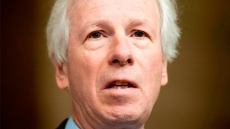MONTREAL — The rules governing the ascension to the British throne are once again being challenged in Quebec.
The province's top court will hear the case of two law professors after Superior Court rejected their challenge of a federal law aimed at changing the rules regarding the British monarchy.
Quebec government lawyers will also present arguments at the appeals court level to defend the province's position that Ottawa should not be acting without consulting it.
The conflict dates back to 2011, when leaders of Commonwealth countries agreed to modify the rules so that a woman, if she is the oldest sibling, could become Queen.
That would put an end to the practice of giving men priority as heirs to the British throne.
The changes were meant to be adopted in each of the Commonwealth nations. The former Conservative government did so in 2013 with a new law.

Universite Laval law professors Patrick Taillon and Genevieve Motard went to court, claiming the law was unconstitutional.
They argued there is no unwritten rule in Canada that makes the British Queen automatically the Queen of Canada, as the federal government asserted.
Furthermore, they said any changes to the rules of the monarchy succession necessitate changes to the Canadian Constitution, which would require the consent of the provinces.
A Quebec judge sided with the federal government in February.
"No amendment to the Constitution is required," Superior Court Justice Claude Bouchard wrote.
Taillon said he has decided to appeal the decision because the law "calls into question Canadian independence."

"It also challenges rights acquired with the repatriation of the Canadian Constitution in 1982."
The British parliament no longer has the power to make laws for Canada and Taillon believes the Superior Court judgment contradicts that.
Taillon says Canada would have two choices if the law is ever struck down.
First of all, it could choose to not open the Constitution, thus not honouring its commitment to the Commonwealth and leaving open the possibility Canada could have a monarch other than the one who reigns in Britain.

Or Canada could choose to seek the consent of the provinces, which risks triggering a series of constitutional disputes that could last years and be politically destabilizing for the country.
"But that might be the occasion to force things through," Taillon said.




